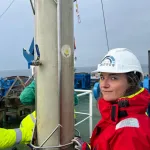BIOPOLE aims to combine data collection, novel analyses and computer simulations to radically improve our ability to measure, understand and predict how nutrient supply and ecosystem processing in the polar regions will be affected by climate change. BIOPOLE will further identify and quantify the wider global impacts on ocean productivity. Data collection will be carried out at both poles in order to address the full Earth system perspective of this problem. It will involve expeditions on land and sea in order to trace the nutrients from their sources and determine their relative prevalence in the open ocean environment. It will use the latest experimental and observational techniques to study elemental processing by the unique polar biotic communities. It will include the use of novel autonomous technologies and unmanned vehicles to collect data over much longer periods and much greater areas than can be achieved by ships alone. Informed by the new understanding generated by these observational campaigns, BIOPOLE will propose and integrate improvements to Earth System Models. These improvements will be used alongside other modelling approaches to better quantify the role that that polar oceans play in global oceanic primary productivity and fish biomass, from which future trends will be better predicted. NOC is collecting novel new observations of nutrients and carbon leaving the Arctic and on processes influencing the nutrient balance of the Arctic, working with partners in the US, Canada and Germany. It is using a range of advanced modelling approaches to track the fate of nutrients and carbon from the crumbling coasts of the Arctic and winter-churned waters of the Southern Ocean into the Atlantic, and to represent huge migrations of small crustacea called copepods to quantify how they help store carbon in the ocean. NOC will also use sophisticated laboratory experiments to assess how tiny plankton respond to and modify the chemical environment of the Arctic.
Oceanographic sampling (sensor and mooring equipment)
BIOPOLE













